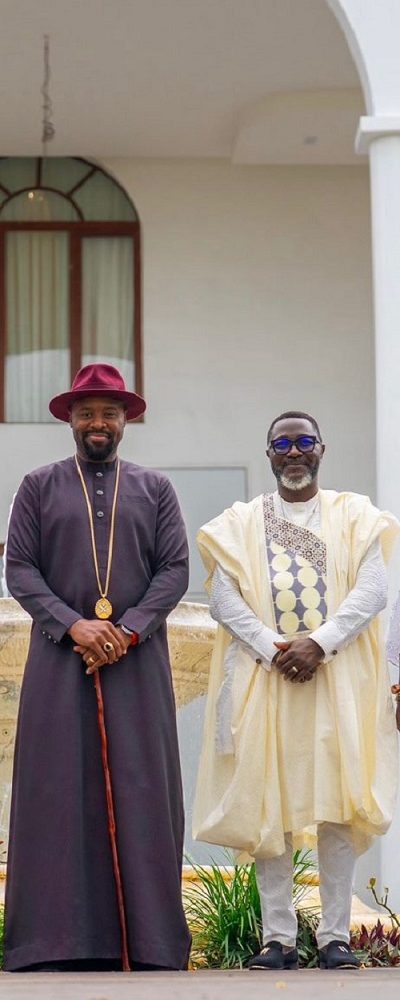-By Sola Adebawo
The intersection of priesthood and royalty, particularly within a Judeo-Christian framework, offers a profound lens through which to examine leadership, spirituality, and societal values. This ancient synergy, deeply embedded in biblical narratives, finds vibrant expression in the contemporary African context, particularly in Nigeria, where traditional royalty often embodies a profound personal faith that beautifully coexists with cultural heritage. This dual role is not just symbolic; they are frequently seen as the custodians of their people’s cultural and religious heritage.
From the earliest days of ancient Israel, the roles of priest and king were distinct yet interwoven. Kings like David were not only political leaders but also men of deep spiritual conviction. This dual mandate – earthly rule guided by divine principles – established a precedent for what many African societies instinctively understand: that true leadership is incomplete without a spiritual foundation.
In Africa, pre-colonial royalty often held sacerdotal roles, seen as divine representatives or custodians of sacred traditions. The Oba, Eze, or Emir was not just a political figure but also a spiritual head, responsible for the moral fabric of their people. With the advent of Christianity, this inherent spirituality did not diminish but often transformed, creating a unique synthesis where traditional authority became infused with Christian faith.
Nigeria provides compelling examples of royalty who are individuals of deep, abiding faith. These monarchs often see their thrones as platforms for service, guided by their spiritual convictions. Their commitment to faith often translates into initiatives that promote peace, education, and moral upliftment within their domains.
Consider, for instance, the Olu of Warri, Ogiame Atuwatse III. His reign has been marked by a clear demonstration of Christian faith, which he openly embraces and integrates into his leadership. This is evident in his respectful engagement with prominent Christian leaders such as Prophet Tomi Arayomi and Rev. Sola Adebawo.
Beyond Christianity, many traditional rulers also embody the blend of religious and professional leadership. The Ooni of Ife, Oba Adeyeye Enitan Ogunwusi, is a powerful example of this. While he is a practicing Christian, he is also the spiritual head of the Yoruba people, tracing his lineage back to the mythical founder of the race, Oduduwa. His role requires him to embrace all religions, and he actively engages with leaders from Christian, Islamic, and traditional faiths, promoting interfaith harmony.
Another compelling case is that of Emir Sanusi Lamido Sanusi. His journey from a distinguished career as the Governor of the Central Bank of Nigeria to his enthronement as Emir of Kano showcases the fusion of professional expertise with traditional and religious leadership. As Emir, he was also the spiritual head of the Kano Emirate, leveraging his deep knowledge of Islamic teachings to advocate for social reforms, particularly in areas like girl-child education.
The Oba of Benin, Ewuare II, is another prime example. As the paramount ruler of the Edo people, his stool is deeply tied to their traditional religion. The Oba is considered a divine representative on earth and performs sacred rituals to ensure the welfare of his people. His authority is both temporal and spiritual, making him the supreme leader in all aspects of life.
A key figure in this regard is the Sultan of Sokoto, Muhammad Sa’ad Abubakar III. As both the Sultan and the President-General of the Nigerian Supreme Council for Islamic Affairs (NSCIA), he is considered the spiritual leader of all Nigerian Muslims. This position gives him a unique platform to promote peace and unity, not only within the Muslim community but also in interfaith relations. He has worked tirelessly with Christian leaders to bridge divides and address national challenges, embodying the idea that religious leadership can be a force for social good.
What makes these relationships particularly impactful is the shared background of many of these leaders. The convergence of high education and sophistication plays a crucial role, allowing for a more nuanced understanding of complex societal issues. This intellectual gravitas often leads to a detribalized perspective, where leaders prioritize universal values and principles of good governance over narrow ethnic interests.
The positive values inspired by these relationships are multifaceted. By openly demonstrating their faith, royalty provides a moral compass for their communities, encouraging ethical conduct and responsible citizenship. These relationships also set a precedent for interfaith harmony and respectful engagement with other faiths, promoting understanding and coexistence.
Furthermore, inspired by their faith, these leaders often champion community development initiatives in education, healthcare, and poverty alleviation, directly impacting the lives of their people.
Finally, rather than seeing faith as a threat to culture, these interactions demonstrate how cultural integration can be positive, allowing Christian and other religious principles to enhance and refine cultural practices, leading to a richer, more richer, more interwoven societal fabric.
In conclusion, the intertwining of priesthood and royalty in the African context is a vibrant and evolving phenomenon. It showcases how ancient traditions can gracefully adapt to modern faith and professionalism, creating a powerful model of leadership. The respectful synergy between figures like Ogiame Atuwatse III, the Ooni of Ife, Emir Sanusi, and the Sultan of Sokoto is not merely a social event but a profound statement about the future of African leadership – one that is educated, sophisticated, and deeply anchored in faith, ultimately fostering positive values and a harmonious cultural landscape.
Sola Adebawo is an accomplished business leader and communications expert with extensive experience in the oil and gas industry. He currently serves as the General Manager of Government, Joint Venture, and External Relations at Heritage Energy. Adebawo is also an author, scholar, and ordained minister, known for his writings on socioeconomic issues, strategic communication and leadership.


Comment here